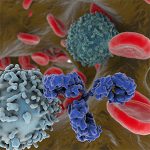 Part I: Organization of the immune system.
Part I: Organization of the immune system.
Thursday June 3, 2021, 11am – 1pm ET.
Part II: The immune system in action.
Tuesday June 15, 2021, 11am – 1pm ET.
In this 2-part workshop on the fundamentals of the immune system, Dr. Jamie Scott, Professor Emerita, Simon Fraser University, Canada, will first provide an overview of humoral and cellular immunity, and the basic structure of the immune system, including its cells, tissues and compartments, along with the “superhighway” of the immune system: the circulatory and lymphatic systems. In that context, innate and adaptive immune systems and their interaction, and the general timing and dynamics of immune responses will be presented.
The processes of lymphocyte development, including the various B- and T-cell subsets, positive and negative selection, and the genetic basis of B-cell and T-cell receptor diversification, will be presented to provide a clear idea of what adaptive-immune receptor repertoires (AIRRs) are, and in general terms, how they are currently assessed via high-throughput sequencing. Dr. Scott will then cover the signaling, activation, proliferation and differentiation of T-cell and B-cell clones in the context of lymphoid compartments where antigen is concentrated and presented to naïve and memory B and T cells. The role of co-stimulation in determining the type immune response generated will be emphasized.
In Part II, Dr. Scott will review the orchestration of systemic and mucosal immune responses, including the roles of tolerance and inflammation in these processes. Examples of immune responses to vaccines, chronic viral infection, and/or cancer, as well as autoimmunity, will be presented as variations on a common theme, reiterating the dynamics of the immune response. Some engineered immunotherapies, such as therapeutic antibodies, CAR-T cells and dendritic-cell vaccines, will be introduced as well.
The importance of AIRR-sequencing data to our understanding of immune responses will be emphasized throughout the latter half of this workshop.



